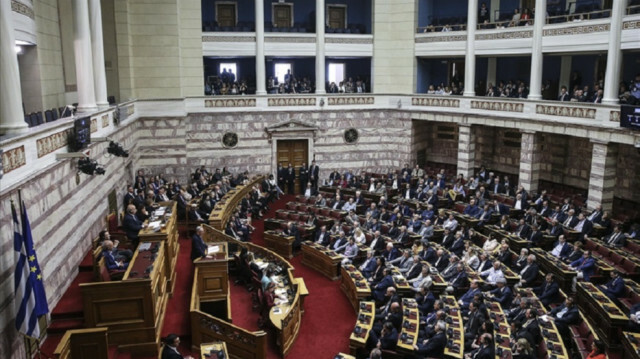
Thousands demonstrate in Athens against bill viewed as anti-labor
The Greek parliament approved a controversial labor bill Wednesday that has sparked outrage.
The bill was approved by 158 ruling party lawmakers in the 300-seat parliament. All opposition parties,142 votes, rejected it in principle.
In a heated debate in parliament between the ruling conservative government of New Democracy and opposition parties, Prime Minister Kyriakos Mitsotakis defended the bill.
It ”builds a modern work environment in our country,” said Mitsotakis, adding that it “brings changes that will finally help the economy and society meet the fast pace of the rest of Europe."
"The employer will not be permitted to occupy the employee after working hours,” he said.
Mitsotakis characterized criticism of the bill as “fake news.”
"Because a number of myths and populism were circulated I will respond with a few words to the fake news that was heard," he said. "Myth one: that the eight-hour workday is being abolished. Anyone claiming this is abolishing the Greek language as well as the social and political logic, since its protection is explicitly stated in Article 55 and can only become a reality if a state leaves Europe."
Main opposition Syriza leader Alexis Tsipras said the bill “legislates more work, less compensation, and absolutely no protection" for workers, and he described it as a revival of the dark ages.
Meanwhile, Greece’s two largest private and public unions, the General Confederation of Greek Workers (GSEE) and the Civil Servants Confederation (ADEDY), staged two demonstrations in Athens earlier Wednesday, along with the Greek Communist Party-affiliated union PAME and other unions.
The country for a second time was brought to a standstill with major disruptions in public transport, media and public services, while ferries remained docked at ports.
Thousands marched toward the parliament building with demonstrators chanting: “Hands off the eight-hour working time.”
The bill introduced in May, foresees flexible working hours, meaning workers will work for up to 10 hours instead of the current 8-hour shift. They, however, will be able to work for fewer hours on another day or take time off.
In addition, a digital card is expected to be introduced which will monitor employees' real-time working hours.
Other measures will include electronic voting for unions before an announced strike. In addition, unions affiliated with public utilities must have at least one-third of employees as emergency staff during a strike.

